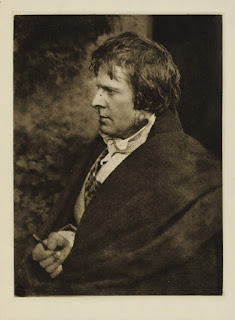Choosing a genre: how Ali Bacon nearly wrote the wrong book
 |
| My hero D.O. Hill, by permission Preus Museum, Norway |
I was inspired to write it by the real story of one man's journey through art and photography and the women who fell, in different ways, under his spell.
The accepted term for a life-story written as a novel is 'fictional biography' , but trawling through some older posts across at https://alibacon.com, I remember that for quite some time I wasn't sure what kind of book In the Blink of an Eye was going to be.
While I explored the shape of the story on the page, I was aware of keeping as closely as I could to ‘the facts’. And new facts were popping up all the time. If I included them all surely it would be non-fiction, or perhaps more correctly 'narrative non-fiction'. Had I really only plumped for the novel because it was the form I knew best?
Next question – what is narrative non-fiction exactly? My one role model for this was Dava Sobel whose Longitude and Galileo’s Daughter I enjoyed years ago before I took up writing. But my own copies had disappeared and my memories were hazy – what was the balance of exposition, action, dialogue? How much drama is there in what I thought of as a drama-documentary?
Another problem was that it was hard to find examples of fictional biography that really satisfied me as a reader of fiction and in those I unearthed it often felt like the writer was too respectful of the subject to craft a satisfying read, especially if the subject's life story was well-known or easy to verify. I understood that respect for the person and for the history. Could I really overcome that barrier and write a compelling book?
 I considered a documentary approach long and hard enough to imagine how such a book would look and where it might begin:- almost certainly, I decided, with the monumental painting which framed my artist's story, a painting that's still in existence (though rarely on public display) today.
I considered a documentary approach long and hard enough to imagine how such a book would look and where it might begin:- almost certainly, I decided, with the monumental painting which framed my artist's story, a painting that's still in existence (though rarely on public display) today. Then, as I panted my way to the end of my first (fiction) draft, a footnote in one of my sources brought up something I had previously missed, a book called Mr Hill’s Big Picture. Yes, the picture that was so often in the front of my mind. I banged in an order and the book arrived a couple of days later.
When it arrived I practically gobbled it up. Yes, it was highly readable (is this what they mean by ‘narrative'?) and covered a big proportion of the material I was using, albeit from a different perspective. Here was the book I had almost begun to write. Just as well I didn't, as someone had got there before me.
Not long after I did some clearing out and found Galileo’s Daughter in my bookcase. It had been there all along. Clearly fate had intervened – or did I just not want to find it? And I did eventually get to some very good fictional biographies (Mrs Hemingway by Naomi Wood, The Jewel by former AE author Catherine Czerkawska) which encouraged me to think the impossible task of melding fact and fiction could be done.
And now it is. Hurrah and also phew! I'm happy I picked the right genre. I just hope my readers agree!
Ali Bacon was born in Fife and lives in Bristol where she writes novels and short stories. A Kettle of Fish, coming of age novel set in Scotland, was published in 2012.
In the Blink of an Eye will be published by Linen Press on April 11th 2018 in paperback and as an e-book.



Comments
It can be more of a problem in films and TV series, where history is often retold for narrative effect (eg some parts of The Crown, which is mostly very good, so even more dangerous to truth when it makes things up).
All the best with your new book, it looks very interesting.